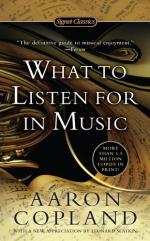|
This section contains 769 words (approx. 2 pages at 400 words per page) |

|
Role of the Composer
Without composers, music would not exist. As both a musician and composer, Copland is well aware of the importance each plays in creation and execution. Through Copland's words, the reader will come to understand that composing is much more than banging out a few notes on a piano. In fact, writing compositions of any kind can be a very complex task. There must be a balanced combination of creativity and technical skill. Composers that study and practice their art are more likely to create music that will speak to its listener. Compositions need not be overly complex to be considered well written. Copeland believes that some of the simplest compositions best represent the composers feeling and expression.
Musical direction has a way of changing and reinventing itself in relation to the times. While this is true, the role of the composer never really changes. The...
|
This section contains 769 words (approx. 2 pages at 400 words per page) |

|




